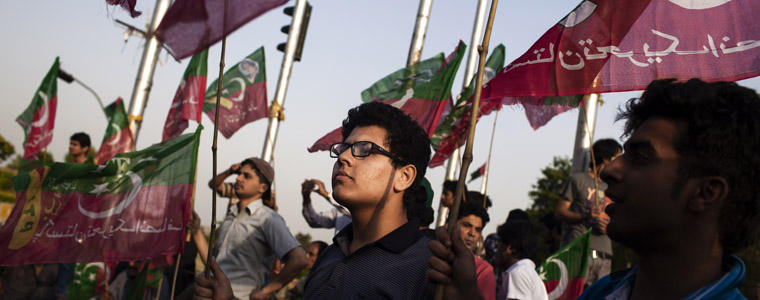Social media took citizen reporting and election monitoring to a new level in this year’s parliamentary and provincial elections, and a USIP-supported initiative captured the enthusiasm to get the public engaged and help monitor for election-related violence and procedural misconduct.

During a historic and vigorous election season in Pakistan this month that energized many of the country’s 86 million registered voters, social media users around the country increasingly relied on a pilot project called PakVotes for news and ways to get involved.
The Twitter handle @PakVotes at one point gained 700 followers in 36 hours and the hashtag #PakVotes trended for the run of the election. The site garnered nearly 11,000 likes on Facebook during its first month. Even major international media and government officials drew on information the project posted online, from the site’s blog to data maps on violence and alleged procedural misconduct, to gauge the public mood and the conduct of the election campaign.
The Pakistani technology and human rights group Bytes for All (B4A) ran the project, with seed funding from USIP. The pilot was part of a range of USIP efforts to encourage peaceful elections and citizen participation in Pakistan. The country’s elections frequently have been marred by violence, perhaps most vividly with the December 2007 assassination of leading candidate and former Prime Minister Benazir Bhutto. Sporadic attacks during this year’s parliamentary and provincial election season failed to deter voters in most of the country, as the excitement spurred in part by third-party candidate and former cricket player Imran Khan generated turnout of 55 percent, according to figures released by the Election Commission of Pakistan, compared with 44 percent in 2008.
The core of the PakVotes project was a network of 40 social media reporters based in 10 districts that were prone to violence and were considered “information dark” because citizens had little access to reliable accounts of what was going on and how the campaigns were being conducted. The pilot grew from there, said Nadia Naviwala, USIP’s country representative in Pakistan.
“The emphasis is on ethical journalism and reporting only confirmed incidents,” Naviwala said. “They have trained citizens and hired professional, dedicated reporters.”
PakVotes developed a code of ethics for how it would collect, verify and share reports and data on social media, said Shahzad Ahmad, who led the project with Annie Zaman.
“We put in place a foolproof process which would vet any bit of information through multiple means and only then post it through our official platforms,” Ahmad said. “In cases where we couldn't be very sure of the information we gathered from any of our field monitors or citizen journalists, we would run it through active social media users in the area in question.”
The role of social media in this election was another step in the evolution of the electoral processes in Pakistan, Andrew Wilder, director of Afghanistan and Pakistan programs for USIP, said during a May 14 panel discussion in Washington. He recalled the increased influence of electronic media in 2008, when he was monitoring polling places, compared with the 1990s. This time around, social media took that to another level. “It will be interesting now to reflect on what role that played,” Wilder said.
The project attracted the attention of the French news agency Agence France-Presse, and Al Jazeera English’s The Stream television program featured PakVotes along with a similar effort, PTI Social Media Team. A student at the University of the Punjab in Lahore, Fakiha Hassan Rizvi, cited PakVotes in a column lamenting the dearth of reliable information and commending efforts to fill the void.
“Citizen Journalists, who usually work voluntarily and are often unpaid workers, will now be making a worthwhile effort during the upcoming elections,” wrote Rizvi, who also is chief editor of the blog The Voice of Youth. “Apart from keeping an eye on the menaces of rigging and bribed voting, they'll also keep a check on media's performance. Reports that will be overlooked by the national media won't go unattended this time as PakVotes aims to project them to social networks like Twitter and Facebook.”
PakVotes engaged top Twitterati, including Jinnah Institute Director Raza Rumi (@RazaRumi), security analyst Norbert Almeida (@Norbalm), columnist Mehmal Sarfraz (@Mehmal), human rights activist Marvi Sirmed (@MarviSirmed), journalist Abid Hussain (@AbidHussayn), lawyer and media personality Ayesha Tammy Haq, (@TammyHaq), journalist Jehanzaib Haque (@Jhaque_), Program Officer at the Foundation Open Society Institute, Asad Baig (@AsadBeg), Former President of Tribal Union Journalists of FATA, Safdar Dawar (@DawarSafdar) and ) Council Member of Human Rights Commission of Pakistan Nasreen Azhar as advisors.
The PakVotes blog featured around 20 writers, many well-known columnists and citizen journalists, including Hassan Belal Zaidi (@MightyObvious_), Aisha Sarwari (@AishaFSarwari), Imran Khan (@iopyne), and self-proclaimed “PTI troll,” Zarlasht Faisal (@ZarlashtFaisal).
“All the team members, even those who went away to cast their votes, are all now online again and working to rock social media in Pakistan,” Ahmad wrote in an e-mail on election day, May 11.
In the future, the developers of PakVotes plan to work on improving their cyber/citizen newsroom, hiring more tech-savvy staff and live-stream discussions about issues that get less focus in traditional media.
“We are aiming to make PakVotes a Twitter-based news service” that could help inform other media, police authorities and academics, said Zaman said. “Our motto is to provide verified news. We are considered responsible and credible on Twitter.”
The next phase also might include a new feature called PakGoverns that would train the PakVotes field monitors on governance issues and freedom of information, Annie Zaman said. They would monitor lawmakers, dig for news and produce investigative reports.
“We believe that the youth in Pakistan need some incentives and guidance,” she said. “PakGoverns can channel the energies of the youth as well as make a platform for public discourse on transparency and governance."
Viola Gienger is a senior writer at USIP.



